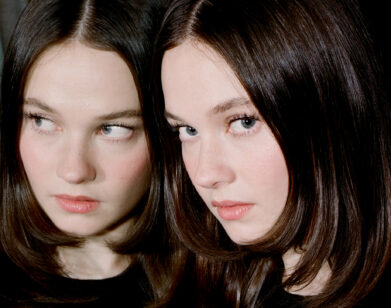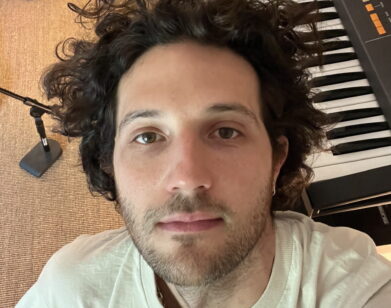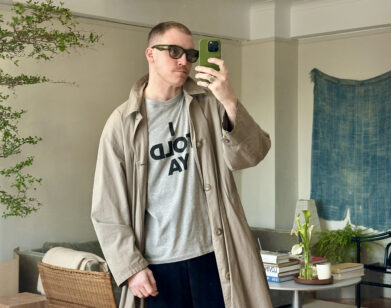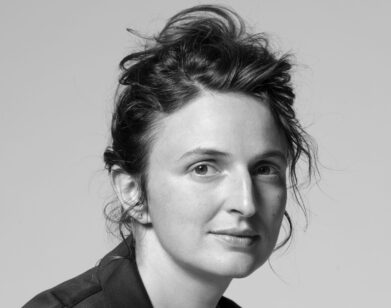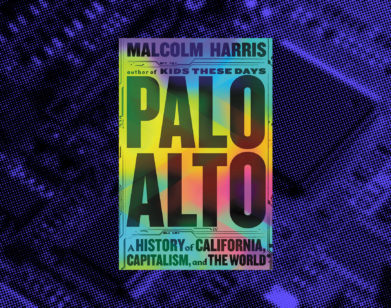ACTOR
Christian Friedel Tells Josh O’Connor About Making The Zone of Interest
At the Telluride Film Festival late last summer, Josh O’Connor finally met the actor who delivered what he considers the performance of the year: Christian Friedel, who plays the S.S. commandant Rudolf Höss in Jonathan Glazer’s disquieting, art-house adaptation of Martin Amis’s novel The Zone of Interest. But O’Connor didn’t know it yet. “We started chatting and I was like, ‘He seems like a nice guy,'” the actor recalled on a Zoom with the 44-year-old Friedel last month. “I had no idea it was you.” That’s a testament to how wholly Friedel transformed himself for the film, in which he and Sandra Hüller, playing Höss’s wife, tend to their five children and their garden while the guard tower at Auschwitz looms terrifyingly in the background. “Sometimes, he said it’s Big Brother in a Nazi house,” Freidel says of Glazer, whose last feature film was 2013’s similarly menacing Under the Skin. In conversation with O’Connor, Friedel talked about the physical toll of embodying evil, from puking to panic attacks, and his earliest encounters with Glazer’s work in Radiohead music videos.
———
JOSH O’CONNOR: I’m so honored I’m getting to speak to you. The story of meeting you has served me so well, I’ve told everyone. I’d just seen The Zone of Interest at Telluride, and then we sat next to each other. I was like, “The film’s incredible, the film of the year, and the main guy, Christian, is unreal. He’s such a brilliant actor. What a performance.” Then someone said, “Oh. Have you met Christian?” We started chatting and I was like, “He seems like a nice guy.” I had no idea it was you. I didn’t know if someone told me or if it just suddenly landed, but it was incredible to me. You transformed so completely.
CHRISTIAN FRIEDEL: [Laughs] Thank you so much. I will never forget the moment your face was frozen.
JOSH O’CONNOR: It was like a cartoon reaction. But it’s so incredible, you must be so proud of it, as a film and as a performance.
CHRISTIAN FRIEDEL: I’m proud, but I’m really grateful to be a part of John’s vision because I grew up with his work. I’m a huge Radiohead fan and Massive Attack fan, and I saw a commercial from Levi’s in a cinema with a man and a woman running through wards. Later, I realized this is all from the vision of Jonathan Glazer. Then when I met him for the first time, he shared his vision, and from the first second I wanted to be a part of it.
JOSH O’CONNOR: How did you first meet Jonathan?
CHRISTIAN FRIEDEL: It was in a pub in London. I remember there was a really famous soccer player next to us. Jonathan was a little bit nervous around him because he’s a huge soccer fan. But I was really nervous because my English was limited and I was nervous that I wouldn’t understand everything. I was listening to his vision. He shared with me rare photographs and the script. We talked about my memories with my grandma and grandpas, conversations about the war and so on. We had a really personal conversation and immediately we had a connection.
JOSH O’CONNOR: From my perspective, having seen the film, what’s so haunting about it is how normal everyday life is, particularly your character. It feels like nothing’s affecting him and that’s what’s so powerful about the movie. Did Jonathan want that feeling. And how hard was that for you to play with?
CHRISTIAN FRIEDEL: Yeah. We didn’t want to make a biopic, we wanted to create situations with ordinary life, as you described. It was not important for me to read the biography of Rudolf Höss in its entirety. I listened to his voice, but it was the voice from a prisoner, not from a perpetrator. It was a challenge to go in with such normality, but we had a lot of improvisations on set. We had no rehearsals, and we immediately started to shoot with this multi-camera system around us. That was well-prepared, and we had all the time in the world. With these improvisations, sometimes it’s helpful for us to find a tone for these lines. From the beginning we talked about Tarkovsky movies, and about the time of the frames, and it’s a lot of time. I think that was the secret: time. With that, you have the opportunity to be boring, to make mistakes, to create variations. He collects all of this and then he chooses in post-production what is good or what is wrong.
O’CONNOR: It almost feels like a documentary, in some ways.
FRIEDEL: You’re totally right. Sometimes, he said it’s Big Brother in a Nazi house.
O’CONNOR: I’m fascinated to know how you transform so much. For me, the preparation part of any role is my favorite. What’s your process?
FRIEDEL: In this case, it was really technical because I had to learn horseback riding. I had a personal trainer to lose weight and gain weight. It’s a small detail, but it was more important for me and for Jonathan to know that I gain weight and lose weight. As an audience, maybe you don’t recognize it. It was difficult to prepare the same way as other movies. As you said, it’s so important to create this character, to read, to watch some documentaries or other movies, or to be inspired, and then you have a picture in your mind. But here, it was really strange. I had these pictures of him in my mind, but I was not sure if they were right or wrong. Jonathan said to me, “It’s always in this tension and this is in your body. If you speak the truth, then lie with your eyes, and if your eyes speak the truth, then lie with your mouth.”
O’CONNOR: The locking of the house I remember vividly. There’s one image that I couldn’t shift for weeks, right at the end of the film. You are walking down the stairs, and then you stop and look. What happens there, what’s happening to Rudolf in that moment? So often I would feel very comfortable in the presence of your character. Then, I would catch something in your eyes, and it would be like, “Is that guilt? Is that shame? Is that pain?” It’s so disconcerting and shook me.
FRIEDEL: I was really afraid of this scene. There’s this puking thing, the throwing up. The last time I threw up was 25 years ago, but I was ready to do this. I had my doctor at my side at the scene, but I was really afraid. I was so concentrated, technically. We had this inspiration from The Act of Killing, the documentary. There’s the perpetrator who explains these things, and then the body reacts. He wants the body to stop, but the body is continuous. This was the way that you believe that the body starts to fight against his mind. We were three or four hours into the night, and in the end I had no voice. I was annoyed by Jonathan, [laughs] because he came to me and said, “Let’s do it again.” In a way, I was empty. He decided in post-production to cut from this moment to the documentary in the museum. Then, he decided it was not written in a script to cut back to him, and it’s our interpretation as a viewer. “Maybe he’s thinking, maybe he’s realizing, maybe he’s reflecting or something,” and then he goes on in the dark, history repeats, and his work repeats.
JOSH O’CONNOR: The idea that the vomit is the body attempting to speak the truth, attempting to understand the mind, is awful. I can really understand how hard that must’ve been to film. The feelings are so huge.
CHRISTIAN FRIEDEL: Jonathan said to us, “Don’t act, be.” So that it is this documentary thing that we feel. We are looking through a window, we observe these characters. It could be a living photograph, but in the night, I had no power anymore. I was tired, I had no voice. But he said, “Go on, let’s do it again.”
JOSH O’CONNOR: Had you worked in that kind of way before?
CHRISTIAN FRIEDEL: Not really. My first movie was with Michael Haneke, The White Ribbon. It was a movie that was so precise: the script, the lines, the situations. Haneke knows every time there will be a cut. Everything was clear. It was great work and I learned a lot.
JOSH O’CONNOR: So you shot this film for how long?
CHRISTIAN FRIEDEL: It was three months in Oświęcim, then we had a break. Then we had two months in the winter, and then I came back one year later for three additional shoots. It was almost two years and 50 shooting days, I would say.
JOSH O’CONNOR: How was it after being in that role and in that character’s head?
CHRISTIAN FRIEDEL: It was an intense cocktail. We were there for three months, in Oświęcim, next to the camp, next to the original house. I was visiting the camp for the first time, as a human and as an actor, too, which was really intense. The responsibility towards the victims was there. To be a German in this place, with this haircut, with this camera system. It was so intense to have these pictures in your mind, and to know what you are doing and to have to say some horrible lines. I was sitting in a cafe in Krakow. I was alone and I had one day off. Then, I had a panic attack. My body, like in the movie, reacts and says, “There’s too much darkness inside of you. Be healthy. That’s not good.” Then, I had the scene with the horse, my last scene in this movie, and I was there in a cold stable for two hours, with a lot of variations. I heard Jonathan on a speaker, “Now cry, now be cold…” We had a lot of variations. Then, John said, “Okay. This was the last scene of this movie,” and then we started crying. I saw La Chimera, and congratulations, Josh. You are so great in this movie. It was so fine, with a fine humor, but with such sadness.
JOSH O’CONNOR: That’s very kind of you to say, but I really understand what you are talking about. Obviously, actors talking about how they find it hard acting is maybe not fashionable, but I think it’s a miracle that you’re okay. For you, the subject matter you are dealing with, your body clearly saying, “Stop, we need to find a way out”—it makes total sense to me, the relief and the pain of saying goodbye to a character you lived with. We’re always trying to empathize and understand the situation of a character, no matter how good or bad they are.
CHRISTIAN FRIEDEL: Yes.
JOSH O’CONNOR: Someone told me that you did press for the film while touring with your band, is that right?
CHRISTIAN FRIEDEL: I had the tour between, which was crazy. But it was great. My bandmates are like a family to me, and music is so important for me. Music helps me to come out and to be on the ground.
JOSH O’CONNOR: Really crazy. I’m so happy that people have responded to the film. I’m a big fan of Jonathan’s, and I think this is my favorite of his films. Your performance is certainly my favorite of the year; it’s the most inspiring performance I think I’ve ever seen. And I’m not surprised in the least that it took so much out of you. I’m so pleased you’re okay and you’re smiling.
CHRISTIAN FRIEDEL: Thank you so much, Josh. That means a lot to me.
JOSH O’CONNOR: Thank you for having me chat with you. It was an honor.





